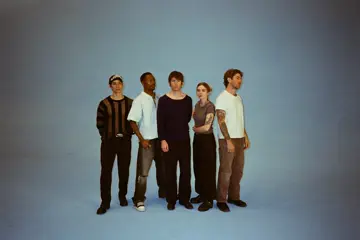In 2006, English filmmaker Carol Morley was flicking through a discarded copy of The Sun on the London underground, and “buried amongst the tabloid crap” she found the story of Joyce Vincent. Vincent had been found in her North London bedsit, dead, with the TV – symbolically – still on. She was only 38 when she died, but had been sitting there, decomposing, for three years. Somehow, Vincent had fallen through the cracks of the social-networking surveillance-state of the modern metropolis; Morley wanted to know how.
“There was very little information about her, or how she possibly could've been left sitting there for three years. Immediately I wanted to make a story about who this woman was, and her legacy; to give her life meaning, somehow,” explains Morley, the Mancunian filmmaker who made a provocative debut with 2000's memoir-as-told-by-others, The Alcohol Years. “I wanted to give a face, to give a life to this anonymous woman; to make her more than an urban myth. To make people never feel like this story can't really have happened.”
The resultant film, Dreams Of A Life, is an artful interpretation of that idea. Morley put in her journalistic groundwork – placing advertisements in papers and on the side of taxis, endlessly tracking down friends and family – but her film isn't, as its title openly attests, a work of classic documentary-making. Faced with the fact that many family members whom she spoke to were happy to talk off the record but unwilling to appear on camera – due to worries about how the world would judge them as complicit in the tragedy – Morley began to concentrate less on Vincent's death, more on her life.
“I wanted to make a film where everybody in it was really happy to be in it; that they were there to talk about Joyce, to acknowledge that they were part of her life,” Morley says; and the parade of on-camera testimonies largely comes from those who knew Vincent in her 20s; who were there to attest to how lively, vivacious, and social – if secretive – the subject was.
Interspersed between the talking heads are less dramatic 'recreations', more pieces of cinematic imagination; these Morley's Dreams of Vincent's Life.
Don't miss a beat with our FREE daily newsletter
“I became very obsessed with Joyce,” Morley says. “Would she like the film, or wouldn't she like the film? What would Joyce think about that? I had dreams – so many dreams! – about her; every night I'd dream about finding her and she was still alive. I found out her family didn't call her Joyce, that they called her Carol, which is my name. That we lived on the same street, and where I live now she lived around the corner. I think that's pretty much the definition of obsession: where you see connections, and find connections, wherever you look.”
Morley shared many of these obsessions with Zawe Ashton, the actress who plays Joyce in dramatic recreations; both of whom would constantly dream of Vincent, feel her with them. “Everyone who was making the film at one time felt her presence,” Morley says. Having devoted five years of her life to making Dreams Of A Life – and spending every day, doing so, thinking of the life and death of Joyce Vincent – the filmmaker feels inextricably linked to her subject. “Joyce will be with me 'til the day I die.”
WHAT: Dreams Of A Life
WHEN & WHERE: Thursday 13 September to Sunday 7 October, ACMI Cinemas















